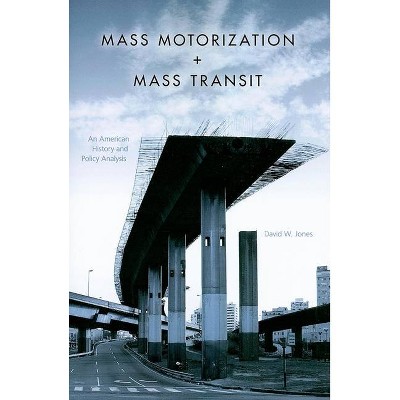Mass Motorization + Mass Transit - by David W Jones (Paperback)

Similar Products
Products of same category from the store
AllProduct info
<p/><br></br><p><b> About the Book </b></p></br></br>No other book offers as comprehensive a history of mass transit, mass motorization, highway development, and suburbanization or provides as penetrating an analysis of the historical differences between motorization in the United States and that of other advanced industrial nations.<p/><br></br><p><b> Book Synopsis </b></p></br></br><p><i>Mass Motorization and Mass Transit</i> examines how the United States became the world's most thoroughly motorized nation and why mass transit has been more displaced in the United States than in any other advanced industrial nation. The book's historical and international perspective provides a uniquely effective framework for understanding both the intensity of U.S. motorization and the difficulties the country will face in moderating its demands on the world's oil supply and reducing the CO2 emissions generated by motor vehicles. No other book offers as comprehensive a history of mass transit, mass motorization, highway development, and suburbanization or provides as penetrating an analysis of the historical differences between motorization in the United States and that of other advanced industrial nations.</p><p/><br></br><p><b> Review Quotes </b></p></br></br><br><p>David Jones does a great job of dispelling myths that many of us hold about the advent of the automobile and the decline of public transit in the United States.</p>-- "publictransport.about.com"<br><br><p>In this sweeping history of urban transportation modernization and post-modernization in the United States, David Jones debunks popular explanations for the decline of mass transit and the rise of mass motorization. . . . offers a solid foundation for debating alternative theses that seek to account for technological change.Vol. 50 July 2009</p>--Gregory Thompson "Technology and Culture"<br><br><p>Jones documents well the politics of postwar efforts by big city mayors to obtain federal aid for rail systems. . . . He provides good evidence for transit's very limited potential to solve the pressing problems of congestion, energy use, and global warming. . . . Highly recommended.March 2009</p>--D. Brand "formerly, Harvard University"<br><br><p>Jones ultimately attributes mass motorization to consumer preferences--for single- family home ownership, suburban living, and sun belt metropolises where low-density development and dispersed employment made automobiles essential.Vol. 96.2 September 2009</p>--Thomas G. Andrews "University of Colorado Denver"<br><br><p>This is a valuable and topical book which brings transport issues to the fore in American domestic and foreign policy. 43 2009</p>--Margaret Walsh "University of Nottingham"<br><p/><br></br><p><b> About the Author </b></p></br></br><p>David W. Jones is a historian and policy analyst who has taught at Stanford University and the University of California at Berkeley, where he served as research manager at the Institute for Transportation Studies. Jones has been a staff consultant to regional transportation planning agencies in the San Francisco Bay Area.</p>
Price History
Price Archive shows prices from various stores, lets you see history and find the cheapest. There is no actual sale on the website. For all support, inquiry and suggestion messagescommunication@pricearchive.us




















